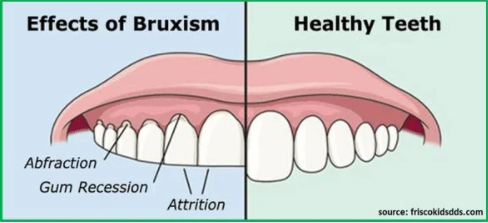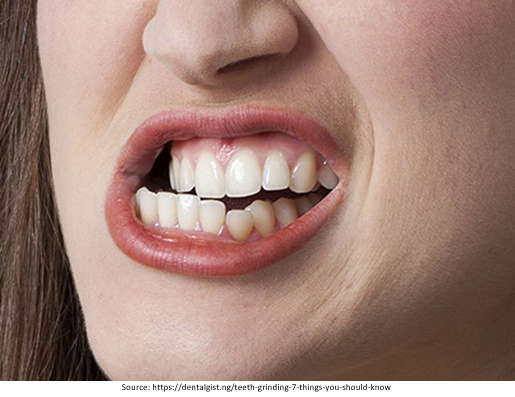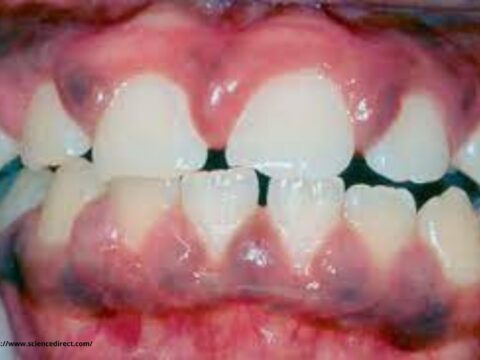What is Bruxism or Teeth Grinding?

Why should you floss your teeth?
March 16, 2021
Tips to get rid of bad breath
April 6, 2021Many people in Kodambakkam suffer from Bruxism, which causes tooth damage. They are, however, completely unaware of it. We’ll talk about bruxism and how to avoid it in this post.
Bruxism causes tooth loss in many people in Kodambakkam, Chennai. They are, however, completely unaware of it. They go to their dental clinic in Kodambakkam, Chennai, in the hope of resolving the problem. In this post, we’ll talk about bruxism and how it can be stopped.
So, let’s talk about what is Bruxism?
What Exactly Is Bruxism, And How Does It Affect Your Life?
When you’re not chewing, you have bruxism, which is when you grit your teeth. When the jaw swings back and forth or sides, the teeth rub or grind against each other. You are usually unaware that you are doing it.
You can clench or grit your teeth at any time of day or night. On the other hand, sleep-related bruxism is more challenging to manage because it is difficult to handle. You should go to your dentist in Kodambakkam, Chennai, and they will help you figure out what’s wrong.
TMJ dysfunction, myofascial muscle pain, and headaches are all potential side effects of bruxism. Severe cases may result in temporomandibular joint arthritis.
Now that you’ve learned what bruxism is let’s look at how it can affect you.
Effects of Bruxism

The clenching or grinding of teeth is referred to as bruxism. Grinding your teeth will cause them to become blunt, short, or broken. Clenching puts pressure on the jaw’s tissues, muscles, and other structures.
It can develop into:
- Jaw pain and weakness
- Gums that hurt
- Teeth that are sensitive, missing, or loose
- Jaw joints that pop or click
- A dull ache in the temples
Earache may occur due to the proximity of the temporomandibular joint structures to the ear canal. Referral pain happens when you experience pain in a location other than the actual source.
Depression, anxiety, eating disorders, and insomnia are all acute symptoms. Relationship problems can arise if the noise wakes up your sleeping partner.
Extreme bruxism, particularly in the molars, can cause damage to the occlusal surfaces of your teeth. It may also cause temporomandibular joint (TMJ) syndrome.
Let’s talk about what triggers bruxism now that you know how it affects you.
What Are the Causes of Bruxism?
While the causes of bruxism are unknown, many factors may be involved.
- Grinding often happens in children when the first teeth erupt and again as the permanent teeth erupt. When the adult teeth have all fallen out, it usually comes to an end.
- Grinding and clenching are typical responses to stressful situations like frustration, concentrating, and anxiety.
- When your jaw closes, bruxism can be associated with an irregular bite, which means your teeth do not match correctly. An occlusal difference arises when the bottom and top teeth do not fit together perfectly.
- Facial muscles spasm in a few people as they sleep. Teeth grinding may be caused by crooked or missing teeth, and discomfort can be a factor.
- Some drugs, such as antidepressants, antipsychotics, and amphetamines, can induce bruxism as a side effect.
- It may be induced by neurological conditions such as Parkinson’s disease or Huntington’s disease.
- Alcohol consumption, exhaustion, smoking, snoring, and sleep apnea are other factors that could be related.
Fortunately, bruxism may be treated depending on the underlying cause. So, let’s look at how bruxism is handled.
Treatment for Bruxism
The cause of bruxism dictates treatment. However, while there is no remedy for bruxism, there are ways to alleviate symptoms and address the underlying cause.
Therapies and Education
Physical therapy, sensitivity, and exercises can help with daytime grinding or clenching. However, since nighttime bruxism is out of your grasp, you’ll need to use different tactics.
If the underlying problem is sleep apnea or stress, treating these conditions can be beneficial. The situation can be reassessed after treatment.
Wear A Mouth Guard At Night
You can shield your teeth by wearing a mouth guard at night. Muscle relaxants may be used for a brief period.
Your mouthguard will eventually wear out and lose its effectiveness. Symptoms and pain can return if you stop wearing the mouth guard. As a result, the solution might not be long-term.
Splints
Splinting is another choice. Only a few splints will fit your top teeth, and even fewer will fit your bottom teeth. A splint can keep your jaw in a relaxed position, depending on the design. It provides a shield so that the splints are weakened rather than the teeth. Splints may be modified or substituted.
Braces for Misaligned jaw
When a misaligned jaw or crooked teeth cause bruxism, your dentist can recommend realigning your jaw or fitting braces to treat the condition. It is not recommended, however, because misalignment is not the cause.
Avoid Food And Drinks With Caffeine
Keeping high-caffeine or high-alcohol foods and drinks out of your diet can help you grind more effectively. Gum chewing can help you develop muscle memory for grinding and clenching, which can contribute to bruxism.
Now that you know how to handle bruxism let’s talk about how to avoid it in the first place.
How Will Bruxism Be Prevented?
If you are prone to bruxism, managing anxiety and stress can help you reduce or prevent it. It is recommended that you practice good sleep hygiene, including sleeping in a cool, dark, quiet room free of laptops, televisions, and other work-related things.
Most experts recommend relaxing in the hours leading up to bedtime and following a relaxing bedtime routine. Children can relax by reading a book, taking a warm bath, or listening to music. Other suggestions include lying on your side or stomach and exercising regularly.
If your condition does not improve, you will need the support of a dental clinic. Your dentist will evaluate your situation and make suggestions for treatment.




